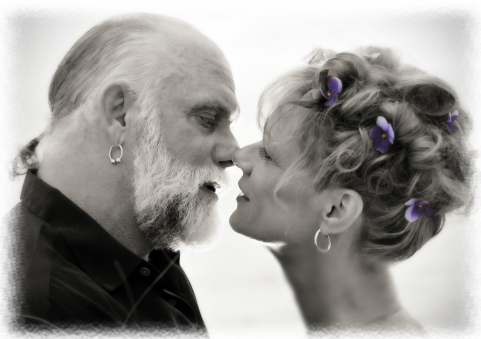|
|---|
Wednesday, September 9, 2009
There is nothing in this world which does not speak. Every thing and every being is continually calling out its nature, its character, its secret; the more the inner sense is open, the more capable it becomes of hearing the voice of all things.Hazrat Inayat Khan
Music, literature, poetry, sculpture, theatre, visual art, dance . . . each of the arts interpenetrates every other. That is to say, in poetry you find music, and in music poetry, in novels you find pictures, and in theatre you find stories . . . .
Each artist will feel a certain affinity to her chosen medium, like it is her birthright. But she will also have a deep appreciation for another art form, one that she has dabbled in, or simply admires . . .
This is the way I am with visual art. I draw for pleasure, drawing relaxes me, but you cannot call me a visual artist.
While the things I've just said make perfect sense, there is one exception to the rule and that is music. Music is an art form that wins all of our hearts. We are all lovers of music.
Have you ever met a person who doesn't like music?
So music is universal, across cultures, and persons, music finds a way into everyone's heart. Artists and non-artists alike appreciate music. Music is an integral part of human nature.
We cannot escape our intimate relationship to music. From childhood, we remember the songs our parents sang to us. My father still talks about the lullabies and prayers his great grandmother would sing over his bed.
During adolescence, our identities meld with certain genres, certain groups. The bands we listen to almost define who we are, our favorite songs describe our feelings and attitudes toward the world. Into adulthood, we cultivate different tastes, and broaden our musical vocabulary, we discover new niches and return to old ones . . .
I listen to music with all of my senses. If it is pop music or electronic, I want to be dancing. Vibration is inherent in music and I can honestly feel these vibrations when my body is moving. If I am listening to a plaintive tune, like Willie Nelson or a song by the Grateful Dead, I like to be still. A great songwriter tells a story, and develops a theme, as a novelist or a dramatist would . . .
Classical is perhaps my favorite type of music. I think the reason for this is that classical feels more like poetry to me. The infinite quality I referred to in "On Poetry", is fully described in a symphony.
I let the music seep into my consciousness, and from there, the music cools me down until I am in a relaxed state.
At one point in my life, lying on the couch listening to classical music became a form of mediation to me. I lit candles, closed my eyes, and opened myself up . . .
I used to have a library card to a private college in my town. This gave me access to a full music library. There were thousands of classical CDs and box sets, Haydn, Mozart, Vivaldi, Beethoven, Lizst, Rachmaninov . . . and I would sift through the stacks, searching for my nightly medicine.
Similar to reading a novel, I like to enter the world of a symphony, become enveloped by it, and forget everything but the strains of violins, the dialogue of cellos, and whispers of wind instruments . . .
Nothing calms me more than resting my head on a cushion and listening to classical music in the evening. I regret that I haven't done this in awhile.
During the day, my head is full of sounds, but none of them important. Mostly these are the manifold voices in my head, one chattering away about deadlines, the other commanding petty anxieties, a third analyzing and evaluating everything from my next meal to a past behavior.
Music is another form of silence for me, because the voices in my head grow still and then dissipate entirely. That silence is worth more than anything I could earn in a day.
When I was ten years old, my parents sent me to Interlochen Summer Arts Camp. Every summer I attended Interlochen for eight weeks. At first, it was a frightening experience, being away from the family for so long, but then I grew used to it and even came to enjoy it.
One of the things they tried to teach me at Interlochen was how to play an instrument. Despite many years of practice, I could never learn how to play the drums. My teachers used to say that I didn't have the attention span.
All of the students at Interlochen were practicing something. There were little music huts scattered throughout the campus, and you would hear trumpet blasts, timpani, violins, pianos, wherever you went; and it was kind of soothing to hear these sounds.
I never achieved even a mediocre success at my chosen instrument. I was always off-beat, and this became a constant reminder that music was not my calling.
Our counselors took us to many concerts, famous orchestras played at Interlochen, Itzhak Perlman was a regular performer (his son, a camper). While I didn't particularly care for classical at twelve years old; later I would recall these moments with great pleasure. On one occasion, I brought a date to the symphony and we held hands during the concert.
The last concert of every summer at Interlochen was a big event, and they always played the same score by Liszt, Les Preludes. In my childhood imagination, the words "Les Preludes" became synonymous with the end of the summer.
Listen to Les Preludes, approx. 17 min
Everyone was crying and hugging each other in the main square outside the concert pavilion. At the famous well in the center of the square, a hubbub of voices echoed with the exaggerated emotions of children being torn from their friends. It was dark and the old-fashioned lanterns illuminated the swarming crowds . . .
The music of Les Preludes ended with such strength, such power, but always left me feeling empty inside. I suppose the emptiness came from the fact that it was the end of the summer, and I knew exactly how each summer ended, with the crowds in the square, crying and holding hands, and signing yearbooks . . .
It was both sad and exhilarating. There was a festival quality to the spectacle after the final concert. But I think I was most sad, not because I was leaving for the summer and I had to say goodbye to people; there were very few people, if any, I was friends with . . . I think I was sad because it felt like I was a spectator looking on.
After the Les Preludes concert ended, the campers funneled out of the pavilion and filled up nearby benches and open spaces. They burst into paroxysms, threw up their arms, shouted, and I walked toward the center of the square . . . . I slowed down, witnessing their strange grief, their celebration, their madness, perhaps I was looking for someone I recognized, or maybe there was someone there who knew me . . . I made my way through the crowds, holding on to those last strains of music, I wandered farther and farther away from the crowds, until the voices died down completely, and it was only me walking back to camp.
Labels: Hazrat Inayat Khan, music, sufi teachings, sufism
0 Comments:
Subscribe to:
Post Comments (Atom)














